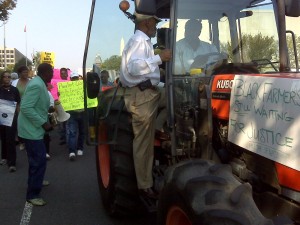
- John W. Boyd Jr., founder and president of the National Black Farmers Association, in discussion with Lawrence Lucas, as he drives “Justice” up Independence Avenue with dozens of fellow black farmers and supporters behind him.
LISTEN TO BLACK FARMERS JOHN W. BOYD JR. and GEORGE HILDEBRANDT HERE:
Audio clip: Adobe Flash Player (version 9 or above) is required to play this audio clip. Download the latest version here. You also need to have JavaScript enabled in your browser.
As it made its way up Independence Avenue, dozens of black farmers and supporters marched behind John W. Boyd, Jr.’s trusted tractor, “Justice.” Thursday’s march began at the U.S. Department of Agriculture and ended with a press conference at the United States Capitol. In front of the Capitol, Boyd, the founder and president of the National Black Farmers Association, was joined by Rep. Sheila Jackson Lee (D-TX), Rep. Bobby Scott (D-VA), Rep. Maxine Waters (D-CA), Sen. Kay Hagan (D-NC), Sen. Blanche Lincoln (D-AR) and Rep. Barbara Lee (D-CA), chair of the Congressional Black Caucus.
The congress members called on their colleagues in the U.S. Senate to follow the U.S. House of Representatives and pass legislation to fund the black farmers’ $1.25 billion discrimination case against the U.S. Department of Agriculture. In February, the Obama administration announced a settlement to the suit, yet black farmers are still waiting to be paid due to the Senate’s failure – on eight separate occasions – to pass legislation funding the agreement, said Boyd.
As he drove “Justice” up 3rd Street, with the Capitol just off to the right and numerous police eyeing the march, Boyd said, “I drove my tractor from my farm in South Hill, Virginia. It took me two days to get here. And I’ve been driving to the Hill every day since I’ve been here for two weeks. And I’m not going home. I’m not going home until the Senate approves this bill for these farmers because they deserve it. Not another farmer should die and not receive justice.”
George Hildebrandt, aged 69, came all the way from his farm in Kansas to join Boyd and others in calling on the U.S. government to provide some justice to black farmers for the years of discrimination they have faced. Hildebrandt said he has made the trip to D.C. too many times to count and he wonders whether these efforts have done any good. Yet Hildebrandt remains hopeful, “Actually, I feel good about this time here because I think we really got people focused in the right way to do something for us. I just hope I’m right.”
